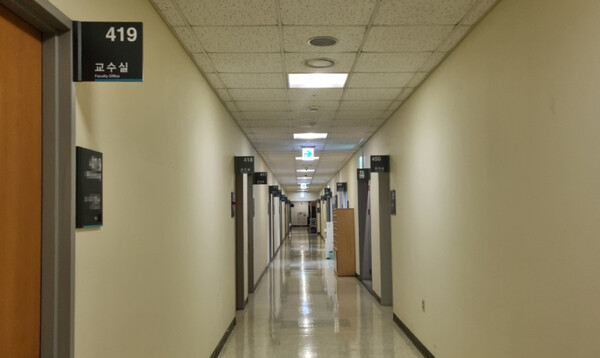As concerns grow over internal conflicts ahead of the return of medical students, confusion is escalating with the emergence of “written oaths,” which require returning students to comply with community rules.
Even parents have jumped into the fray, accusing the deans of medical schools of fomenting division within the school.

On Tuesday, the Korean Association of Medical Colleges (KAMC) released a pledge form for returning medical students, requesting that each school use it as a reference. That appeared to be a preventive measure in response to concerns about internal conflicts between students who have already returned and those about to return.
The pledge includes a clause stating that those who violate the campus community order will accept responsibility and penalties as outlined in school regulations.
Additionally, the deans decided to align their academic schedules so that fourth-year medical students returning this time can graduate in August of next year. They also decided to request that the government hold additional national medical licensing exams.
However, there was a backlash to this policy, with opponents claiming that universities attempt to control and discriminate against returning students.
On Wednesday, the National Association of Medical Students’ Parents (NAMSP) issued a statement, saying that the pledge requirement is “control in the name of order” and demanding its immediate withdrawal. The association also emphasized that all fourth-year undergraduate students should be guaranteed the opportunity to take the national medical licensing exam.
The parents’ group criticized the pledge proposed by the college deans as a “political submission statement demanding conditional loyalty from medical students.” It also criticized the university president for “fostering and condoning conflict among students instead of mediating it.”
The parents noted that universities are dividing medical students into “compliers” and “troublemakers” based on their return date, forcing them to sign the pledge, and demanding that “returning students be loyal to the university's policies” and “remain silent about criticism of students who returned earlier.”
They added that deans are becoming the centers of division within the university, and in some universities, professors openly criticize specific medical students during class or internal meetings.
In discussing the crisis in medical education, we must first examine who is responsible for this crisis. Before forcing returning students to write statements of reflection, the schools must first engage in self-reflection for neglecting the collapsed education system and accepting an increase in enrollment quotas,” the parents' group said.
It pointed out that universities had blindly accepted the government's policies, such as admissions procedures without proper processes and undetermined curricula, adding that while students had borne the consequences, the universities were now shifting moral responsibility onto returning students by forcing them to sign pledges without apology.
The group criticized the policy allowing returning fourth-year students to graduate in August next year as “discrimination that limits their opportunity to take the national medical licensing exam.”
“Unlike some students who returned earlier, the fourth-year students returning this time are likely to face discrimination regarding their eligibility to take the national exam or their graduation timeline,” it said. “Differing exam eligibility based solely on the timing of return, despite being in the same grade, constitutes discriminatory selection and unfair compensation.”
National exams should be administered fairly to those who meet the qualifications, the group said, urging the Ministry of Education to immediately withdraw all attempts to give opportunities as a form of discipline selectively and calling for measures to ensure that all students can take the exam under equal conditions.
"The conflict between students is not the responsibility of the students, but the responsibility of the school that neglected them. Do not force silence under the guise of ‘order,’” it said. “The restoration of student society begins with dialogue and community mediation, not with pledges. Before demanding reflection from students, reflect on yourselves first."
Related articles
- Med school deans struggle to align graduation timeline as students return
- Patient group urges trainee doctors to ‘return voluntarily and unconditionally’
- Foreign medical school graduates passing Korea's medical exam triples in 2025
- University presidents decide to allow failing medical students to return in the second semester
- Health minister nominee backs public medical schools, vows structural reforms
- Professors demand state action to repair Korea's medical education system
- Medical students apologize as they return to class after year-long standoff

